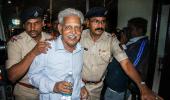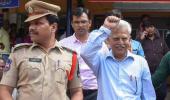The Maharashtra government on Wednesday agreed to shift jailed poet-activist Varavara Rao, an accused in the Elgar Parishad-Maoist links case, to the Nanavati Hospital here after the Bombay high court asked how it could say no to someone on his "deathbed" seeking relief.

Following the intervention of a bench of Justices S S Shinde and Madhav Jamdar, the state said it will shift Rao (81), who is lodged as an under-trial in the Taloja prison in neighbouring Navi Mumbai, to the Nanavati Hospital as a "special case" for treatment for 15 days.
The bench passed its orders while hearing a writ petition filed by Rao's wife Hemlata seeking that the activist be shifted from the Taloja prison hospital to the Nanavati Hospital immediately, since his continued detention was a breach of his fundamental rights.
The bench noted that besides his neurological ailments, Rao tested positive for coronavirus in July this year and was in need of post-COVID-19 care.
"Ultimately, there is a man on death bed. He is 80 years old and has serious disease. He will come to court. Can the state say, no we will treat him in Taloja?" the HC said.
The court directed that the cost of Rao's treatment at the Nanavati Hospital, a private medical facility, will be borne by the state government.
Public Prosecutor Deepak Thakre had initially suggested that while Rao would be shifted to the Nanavati Hospital, he would have to bear the cost of treatment.
Rao's counsel Indira Jaising argued that the Supreme Court had held that a state could not cite lack of money as a reason to not look after a citizen's fundamental rights.
The bench accepted the submission and reminded the state that even at the Nanavati Hospital, Rao would continue to remain in judicial custody. Therefore, the state was bound to pay for his treatment.
"He (Rao) is in your (state) custody. Even in the hospital he will remain in your custody, so you pay for the treatment," the bench said.
Thakre then spoke to Maharashtra home minister Anil Deshmukh and told the court that the state had no objection in shifting Rao to the Nanavati Hospital for 15 days.
He said Rao being shifted to a private multispeciality hospital would be treated as a "special case" and not a precedent for other cases.
The court also asked the National Investigation Agency, the prosecuting agency in the Elgar Parishad-Maoists link case, what was the current state of the case.
To this, Additional Solicitor General Anil Singh, the probing agency's counsel, said the framing of charges was pending before a special NIA court in Mumbai.
Advocate Anand Grover, who appeared along with Jaising for Rao, told the court that it would take "at least a year to frame charges" in the case as it was based primarily on computer evidence.
Grover said clone copies of evidence had not yet been provided to the special NIA court, and added that there were 30 accused persons in the case.
Jaising then said there existed a possibility that Rao could die while in prison and that he was susceptible to suffering from a multiple organ failure.
She further argued that the purpose of incarcerating an under-trial was to ensure he did not flee justice.
But, Rao was bed-ridden and had lost comprehension of reality, therefore there was no question of him fleeing, Jaising said.
She reiterated that Rao was in need of specialists and the Taloja prison hospital was incapable of providing him the requisite treatment.
"Who will take responsibility if he dies? He has had a heart attack in the Nanavati Hospital. If anything happens to him, it will be nothing short of a custodial death," she said.
Jaising also told the court that Rao was being looked after in the prison by his co-accused Vernon Gonsalves and Arun Ferreira, who were not medically trained.
She also raised doubts on the blood and urine tests of Rao conducted by the prison authorities following a previous HC order, and said the samples seemed to have contaminated and the reports mentioned Rao's age as 54.
The high court then asked the state if the Taloja prison had a neurologist or a neurosurgeon.
The state said it didn't.
The court accepted Jaising's submissions on the need for specialists to examine and treat Rao.
It also agreed that an examination via a video link wouldn't be enough in the present case.
She said Rao was examined last week by doctors of the Nanavati Hospital through a video link only for 15 minutes, which was not adequate.
The bench agreed that proper medical examination was not possible over 15 minutes of video call.
The HC asked the state to make a statement on shifting Rao to the Nanavati Hospital, adding that otherwise it would have to pass orders to the effect.
Thakre then said the state was agreeable to shifting Rao to the Nanavati Hospital immediately.
"Mr Deepak Thakare, the learnedPublic Prosecutor appearing for the Respondent/State intervenes, and on instructions from the Honble Minister of Home Affairs, Government of Maharashtra, makes a statement that as a special case, Dr P V Varavara Rao, will be immediately sent to Nanavati Super Speciality Hospital, Mumbai for further investigation and treatment," the HC said.
"Statement accepted," it further said while adding that Rao's family members be permitted to meet him as per the Nanavati Hospital's protocol.
The HC also directed the state to submit Rao's medical reports from Nanavati Hospital, to the court in sealed covers.
The bench further directed that he should not be discharged from the hospital without informing the court.
Besides the writ petition filed by Rao's wife, the HC was also hearing the activist's bail plea on medical grounds.
Jaising, however, did not press for bail on Wednesday after the court suggested she restrict her arguments to the interim relief of shifting Rao to the Nanavati Hospital.
The HC will hear the pleas next on December 3.
Rao has been in an out of the government-run J J Hospital here and the Taloja prison hospital since his arrest in June 2018.
On July 16, he tested positive for coronavirus, after which he was shifted to the Nanavati Hospital. He was discharged from there following a final assessment report on July 30 and sent back to the Taloja prison.
Last week, Jaising urged the court to direct the state to shift Rao to the Nanavati Hospital immediately.
She had said there existed an apprehension that Rao might lose his life while in prison.
Jaising at that time also said Rao had dementia, had lost control of his bladder, was in diapers, and his condition was deteriorating with each passing day.
She alleged that the state had been negligent in taking care of Rao while he was in prison and if he died, it would be a case of custodial death.
Following the submissions, HC had ordered his video examination while giving Nanavati Hospital's doctors the liberty to examine him physically at the prison if it was required.
Rao has been booked by the NIA under the stringent Unlawful Activities (Prevention) Act.
He and some other activists connected to the Elgar Parishad conclave held in Pune in December 2017 have been accused of having links with Naxals.










 © 2025
© 2025